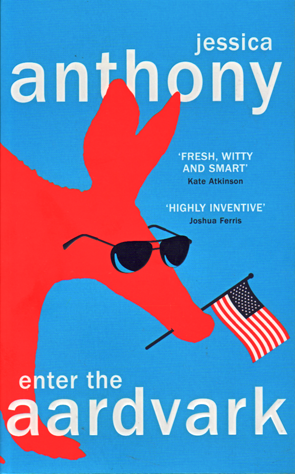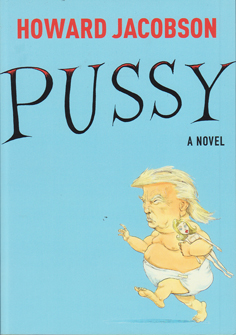There has been a range of books published about the Trump administration in the past few years, including satirical novels like Howard Jacobson’s Pussy and Paul Eggers’s The Captain and the Glory. Jessica Anthony’s Enter the Aardvark is something a little different in political satire. Anthony’s novel doesn’t have a representation of President Trump, nor does it reference specific aspects of Trump’s campaign or his presidency. Instead it paints a broader picture of American partisanship and engenders a sense of how illogical some political positions have become.
Jessica Anthony’s book is self-consciously inventive. It’s a quality that mostly works but sometimes doesn’t. The following covers some aspects of Anthony’s style that stand out.
First, not so exceptional, but important to the meaning and structure of the novel, is the parallel stories of the nineteenth-century taxidermist, Titus Downing and his close friend
(read ‘gay lover’) Sir Richard Ostlet, and the twenty-first century Republican congressman Alexander Paine Wilson and his friend (read ‘gay lover’ but Not Gay
- simply both straight guys who occasionally like other straight guys who like to suck or stroke cocks
), Greg Tampico. In the nineteenth-century Sir Richard, who suffers from exophthalmos (the oddest condition where the suffer’s eyes occasionally bulge out of their orbits … [even] … pop right out, secured only by their optic nerves
) has his eyes removed to quell his suffering. Meanwhile, Downing, hoping to capture some of the jiva, the immortal essence of each living being
, of a recently captured aardvark, chooses to preserve his lover’s eyes to finish off his unusual taxidermical specimen. In the modern era congressman Wilson, who is running for re-election in First Congressional District in Virgina, takes delivery from a FedEx driver of a rather large and mysterious package: the stuffed aardvark from the other half of the story. Wilson recognises the creature – it belongs to his Not Gay lover, Greg Tampico. The alluring nature of the animal – its coy but flirtatious expression achieved through its unusual blue eyes, is not lost on Wilson.
Second, is the contextual framing of the near-contemporary stories with the history of the Earth: everything, in fact, that has led to the evolution of the aardvark’s unusual features (ears like a rabbit, tale like a kangaroo, snout like an elongated pig: a veritable evolutionary menagerie, like the platypus). The word enter
is endlessly repeated, signifying everything from the spectacular progress of evolution (Enter the buccal snout…
), to the entrances of characters into the narrative, like a stage direction, or to the bland instruction of Sir Richard Ostlet to his young assistant, to enter the aardvark
in the ledger of his natural history notes. By framing the main story in this way Anthony gives us perspective over Wilson’s political concerns – the present framed by a millennia – and his ambitions and his lack of self-awareness. Not only does he deny his own sexuality, but he is willing to persecute minority groups, including gays, and erode hard-won feminist rights to shore up his own fragile conservative identity. Wilson’s hero is Ronald Reagan, and as much as possible, he tries to recreate Reagan’s life, right down to the clothes Reagan wore and the furniture he owned. Added to this is the perspective the narrative framework provides the political times: of the certainties claimed by all political factions from a position of temporal parochialism.
Finally, Anthony employs the use of second person narrative – you
rather than I
or he
– for Congressman Wilson’s story. I found it a little jarring, at first, but there is something funny about a man who needs his own life narrated to him, again suggesting his cluelessness. Ironically, it is also an effective way to distance the reader from Wilson’s point of view.
However, when the aardvark arrives Wilson understands the political danger to which he might be exposed. The aardvark may tie him to Greg Tampico and their Not Gay relationship. Already under pressure to find a wife so as to remain competitive against his opponent, Nancy Fucking Beavers
(really, is Anthony linking animals to sexuality again!), Wilson can’t afford his secret to become public. Even worse, the aardvark once belonged to Hermann Göring! However, as Wilson attempts to return the aardvark to Tampico, he is pulled over by a cop for talking on his phone while driving. The cop immediately senses a latent eroticism between Wilson and the aardvark. Suddenly, Wilson’s world is about to fall apart in a most public manner.
Jessica Anthony’s story is outrageous, funny and highly improbable. At times this works extremely well, dazzling the reader with clever connections and well-designed metaphors. The ragbag assemblage of the aardvark, for instance, brilliantly evokes both the diverse identity of America as well as the bastardised character of political partisanship: of the disconnect, for instance, between Wilson’s personal and public personas. Yet there are wrong notes in the story as well. Lady Ostlet believes in the eternal nature of the soul, which is fine. But the narrative adopts it as a metaphor, requiring the reader, already reading this story framed by evolutionary theory, to adopt neo-Platonic ideals of the soul as part of the baggage of the story. And let’s be generous and say that that’s okay, too, since it does help along the idea that the old and new stories are connected, and that the aardvark is imbued with Ostlet’s spirit. But Anthony goes a step further by resurrecting Ostlet as a ghost – or so it seems – obliging the author to attempt one of the most unforgivable narrative blunders: forced, clumsy exposition; the narrative equivalent of thrashing frantically with a spade in a deep hole.
But Enter the Aardvark is mostly an accomplished piece of writing, despite that. It marries the two halves of its narrative almost seamlessly. We focus upon the tragic tale of Sir Richard Ostlet, his wife Rebecca and his lover, Titus Downing, which exemplifies the impact of social intolerance on the lives of individuals, or we laugh at the inane Alexander Wilson, who chooses to support institutionalised intolerance, his certainties born not from self-awareness, but the assurance of his possessions and the money he has paid for them; of his approval rating rather than a studied understanding of himself and his political agenda. At the same time, however, we glimpse a fractured America, riven by political partisanship – Wilson himself advocates the country splitting in two along party lines (the Red States are ready to split, it freaking guarantees an electorate
) – and reduced by lack of empathy for minorities and women.
Enter the Aardvark does not attempt to lampoon any specific individual or policy. Instead, it emphasises the ludicrous places we may be taken by political partisanship, and sounds a warning that policy must be informed by an understanding of humanity’s broad range. To do so, we must fully understand not only ourselves but our political antecedents. This is a fun book and recommended.
Related Books Reviewed on this Website

 RSS Feed
RSS Feed Facebook
Facebook Instagram
Instagram YouTube
YouTube Subscribe to our Newsletter
Subscribe to our Newsletter








No one has commented yet. Be the first!